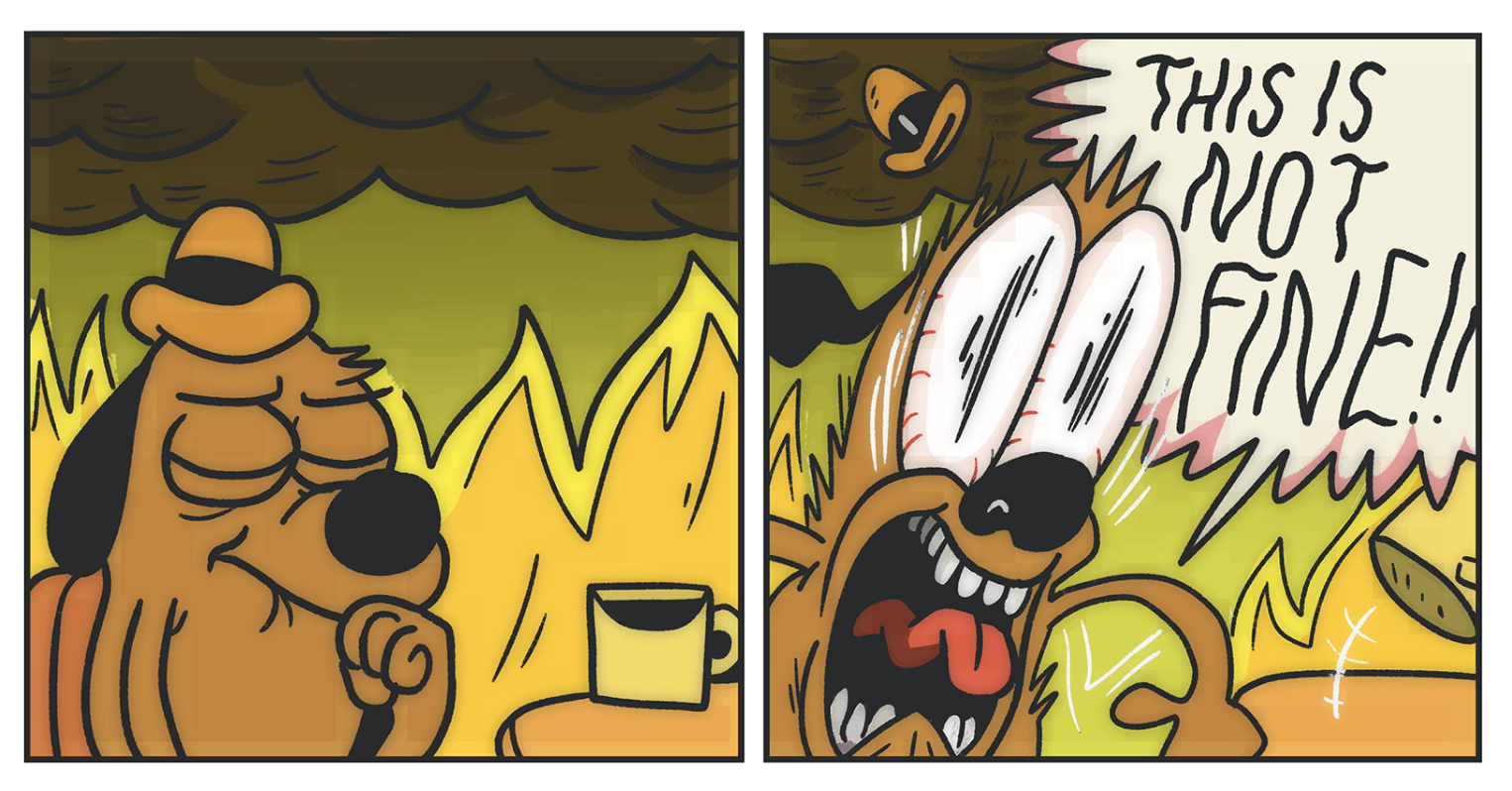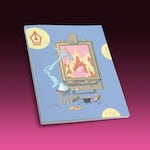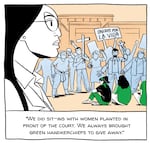
An excerpt from "This is Not Fine" by KC Green, a follow-up comic to the iconic meme.
KC Green / Courtesy of KC Green and The Nib
After 10 years, the award-winning comics website and independent publisher The Nib is shutting down this summer.
Over the last decade, The Nib has been a prominent hub for comics journalists, political cartoonists, illustrators and their work, with more than 6,000 comics published and over $2 million paid to artists and contributors — including many based in Portland. The Nib has been at the forefront of political satire, journalism, essays and memoir in comics form.
As The Nib prepares to take a bow with its final issue, we took a look back with Matt Bors. He’s a two-time Pulitzer Prize finalist for editorial cartooning, and the founder and editor of The Nib. We also talked with award-winning graphic novelist, zinester and contributing editor for The Nib, Sarah Shay Mirk.
They spoke with OPB’s Donald Orr about the legacy The Nib leaves behind.
Listen in, or read an edited transcript of their conversation below.

The cover of The Nib #15, "The Future," the final print issue. Cover art by Ben Passmore.
Ben Passmore / Courtesy of Ben Passmore and The Nib
Donald Orr: First, I wanna say congratulations on 10 years of work, and I’m sorry to hear it’s shutting down. I know you still have a summer of content to put out online, and one last issue to publish. But as you get ready to look in the rearview mirror, what do you hope the lasting impact is for creators, cartoonists and the community at large?
Matt Bors: Well you know, the reason why I started The Nib in the first place was to establish a place for political cartoons and nonfiction comics, which at the time in 2013, political cartooning was sort of famously dying. And then nonfiction cartooning was sort of just starting to flourish.
So my hope is I think that we contributed to that a lot, we provided a platform for a lot of cartoonists over the years. We’ve published 6,000-some comics. Careers have been launched from The Nib, some book projects. So I’m happy about that, and I hope that that’s the legacy for comic creators.
Sarah Shay Mirk: Yeah, I think for me, the biggest impact has been creating a community around political comics and nonfiction comics from artists all over the world. So political cartooning can be a very isolating act, like you’re drawing by yourself in your studio. And The Nib really created this like network of connections between people sharing their work. And as an editor, I got to work with artists from all over the world who are expressing themselves.
I also think that The Nib, very importantly, was a platform to publish young artists, artists who are people of color, queer artists and other people who are marginalized by the mainstream publishing industry and the comics industry. So Matt could definitely speak to this, but the world of political cartooning and nonfiction comics has often been, like, old, white men.
But there’s now this whole generation of younger artists. A lot of them are people of color, a lot of them are under 40 and they have really great ideas, really funny work and are extremely talented artists. That’s who The Nib has really been a home for. For me, that’s been really the heart of what The Nib does, is publish comics that nobody else is gonna publish. We’re the home for comics that don’t have a home elsewhere.
So I think that that will continue in terms of the careers that we’ve helped launch, and the community that we’ve helped make, I think, will continue hopefully for this next generation of artists.
Orr: What role do you feel like comics and comics journalism continue to have, as far as shaping and informing the world around us? What do you think is unique to the medium that challenges readers, and where was The Nib’s place in that?
Bors: Well, I know that nonfiction comics, I think, is doing better than it ever has been. And there’s a lot more work being produced in that field. Hell, a lot of our contributors got really good book deals and had to stop doing work for us because they had their graphic novel deadline. I can’t take credit for all that, by any means. I think the state of the field is thriving.
Mirk: Yeah. And The Nib has been a good place for artists to experiment and get paid for it. That’s a really big deal. A kind of like a joke in comics is that you don’t get paid for it very well. And it’s pretty radical that The Nib was paying really good rates for really great art. And that’s why we were able to publish so many really awesome cartoonists, because we’re willing to pay for really good work. And that’s been really, like, a core value for The Nib.
Part of why we’re shutting down is because Matt doesn’t want to stop paying people. He would rather go out with everyone treated really well and everyone paid really fairly. So I feel really actually proud of Matt for making the call to end now when we have money in the bank, rather than what often happens with publications is the writers or the artists get screwed. So part of the whole values and ethos of The Nib is paying artists a really fair rate for really great work.

An excerpt from "Marea Verde Rising" by Sarah Shay Mirk and Laura Athayde
Courtesy of Sarah Shay Mirk and Laura Athayde
You asked about how The Nib has shaped the power of comics or what role comics can play in shaping culture. I really believe that comics have the power to shape the narratives that we tell about ourselves, and that we tell about our country and that we tell about our world. Comics have a real power to create empathy in people because you’re seeing these images on the page and you connect with them in a visceral way. You can see people’s expressions, you can see what they’re wearing, you can see where they’re living. It just has a real emotional power.
And comics, nonfiction comics, are really about trying to capture that emotional reality and convey the feelings through the page. It’s not just about illustrating a Wikipedia entry or making an infographic with a bunch of data. It’s about capturing the feelings that are happening in a story in somebody’s life. And that’s pretty powerful to read.

"Faked Out" by Mattie Lubchansky.
Mattie Lubchansky / Courtesy of Mattie Lubchansky and The Nib
Orr: After 10 years, what are y’all most proud of?
Bors: Well, I’m proud to say I paid out $2 million to cartoonists and they all kept the rights to their work and all that. That’s what The Nib was about and why I started it.
I’m most proud, on a more specific level, I’m most proud of the magazine. I wanted to do a print magazine for a really long time, it was on my mind pretty early on. Maybe even before I started The Nib, but we didn’t get to that until 2018 or so. And we got 15 issues out of it when I started it. I didn’t know how many we were gonna do. A hundred would have been great, but I’m real happy with the 15 we got. We started with death and we’re ending with the future. It’s all good.
Mirk: I feel really proud of the editing work that we’ve done. Several contributors tell me they would not have made a comic if they didn’t have a place to publish it in The Nib, and that we really helped them get their work published.
And then other contributors say they wouldn’t have kept making comics if The Nib didn’t keep publishing their work. It’s been really special for me to be able to have a place that can support those artists and support those comics and say, ‘We’re not only gonna publish your work and pay you for it, but we’re gonna edit this comic so that it can be the best it can possibly be.’
So it’s been really a gift for me to work as an editor with artists and support their vision and support their work and to have those artists say, like, ‘This comic is so good and I’m so happy with the editing process.’ We were able to bring comics into the world that wouldn’t have existed otherwise. That feels really powerful to me.






